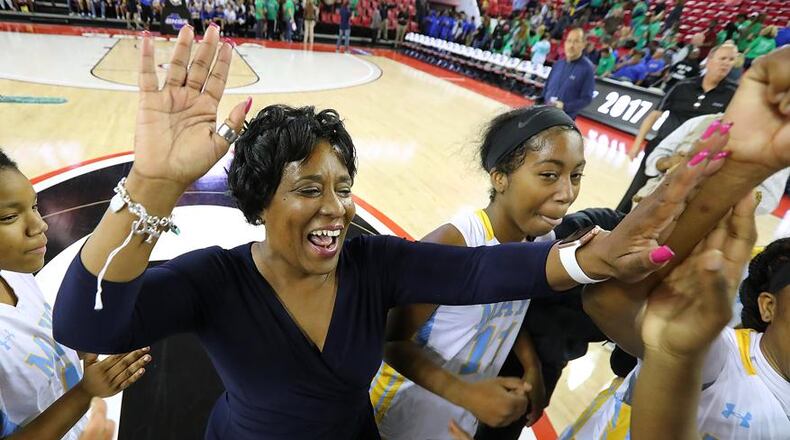In 2017, UConn women’s basketball coach Geno Auriemma drew ire with a tone-deaf comment, saying the reason for a decade-long decline of the number of women’s coaches at the collegiate level was because, “not as many women want to coach.”
In many cases, women have to choose between the time-consuming commitment of coaching or parenting. As child-bearers, women inherently take on a bigger role in co-parenting, which is what made Auriemma’s quote so polarizing.
“That’s the way of the world right now,” said long-time Westlake High School girls coach Hilda Hankerson, who took over the Lady Lions program in 1997 and won the Class AAAAAAA championship last season. “The same amount of respect is not given (to women as men).”
But while statistics show a decline in women coaches at the NCAA level, there is good news when it comes to women coaching girls high school basketball in Georgia. An AJC survey showed an upward trend of women coaching girls programs in the state that spans decades, according to information included in the GHSA Member School Directories provided to the AJC by the organization.
The numbers shows that for the 2019-20 GHSA girls basketball season there are 211 women coaches out of 436, or 48 percent. That’s more than a six-percent increase from ’09-10, when there were 170 of 397, or 42.8 percent. In 1999-2000, there were 137 out of 341, or 40.1 percent. The oldest of the GHSA produced staff directories on file, from the 1973-74 school year, showed 96 of 323, or 29 percent.
To make sure that upward trend continues, veteran women coaches in the metro Atlanta area, led by Mays coach Chantay Frost, have formed the “Hoops and Heels” organization, which hosts annual seminars for girls and women to encourage increased participation in coaching and playing aspects of basketball.
“We are seeing more women coaching,” Hankerson said. “But what we’re not seeing is longevity. That’s the thing that’s most concerning. What happens is when a school is in severe need of a coach for the girls program, a lot of times they’ll just grab an assistant coach from the football team and say, ‘Hey, can you do this for me?’”
Added Frost: “It’s good that the numbers are increasing but it’s still not increasing at the rate that it should be. Surely, it shouldn’t be under 50 percent — especially when there’s almost no women coaching boys. If males are coaching girls, and no females are coaching boys, where do the opportunities for female coaches lie?”
Between the 2018-19 season and this season, there were 16 instances in which males replaced female coaches. There were 22 instances in which a female replaced a male coach — a net gain of six females. A female coach replaced a female coach 25 times, and a male replaced a male 32 times.
While Hankerson and Frost both make it clear they believe there is nothing wrong with men coaching girls basketball teams, they also believe it’s important for girls to have women in that authoritative role.
“When a female coach steps down I feel like there should be an active push to replace them with another female,” Frost said. “I’m not saying males can’t coach girls, but there’s something to be said for females coaching females.”
To drive that point home, there’s an experience Hankerson had early in her Westlake coaching career that has always stuck with her. A young girl, who was a freshman and playing basketball in Miami, suffered the death of her mother, and her father, who lived in Atlanta, became her caretaker. She finished out her ninth-grade year with family in Miami, but then moved to Atlanta. Her father asked his network where he should send his daughter for school and the overwhelming response was to Westlake, where she could be coached by Hankerson.
“They told him his daughter needed a female figure in her life,” Hankerson said. “He didn’t tell me this story until years later. He said it was the best thing he could have done because he couldn’t teach her how to be a lady.”
Frost’s coaching career, which includes five state championships, spans more than 30 years at Walton, Columbia and Mays. She and Hankerson acknowledge they will be stepping away from coaching sooner than later. When it’s time to pass the torch of their programs, they want to make sure it’s to the hands of other women. They also realize the multitude of challenges women face to become — and remain — coaches.
Becoming wives and mothers is an obvious challenge, but there are also other, more subtle ones. Frost points out that the participation numbers for girls basketball has dropped, in her opinion, because cell phones and social media hinder a solid work ethic. A 2019 Associated Press story found girls participation in basketball has dropped 10 percent since the 2001-02 season.
Participation in basketball at the youth level lays the foundation for females to eventually become head coaches. Frost realizes this, which is why she founded Hoops and Heels in 2017. The idea to create Hoops and Heels was formed during a series of lunch discussions between Frost, Hankerson and a number of other veteran coaches.
Before each season starts, Hoops and Heels hosts an annual seminar, which features round-table discussions for coaches and girls. The WNBA’s Atlanta Dream has had representatives participate in the past, and the team has provided branded drawstring bags filled socks, t-shirts and other related accessories. The 2019 seminar was held at McEachern, where coach Phyllis Arthur has coached since 2007, guiding the Lady Indians to five championships in six years, including four in a row from 2014-17.
“Ultimately what we’re trying to do is create a legacy,” Frost said. “We want to leave the sport in good hands, so we mentor coaches and girls to create a line of female coaches.”
About the Author
The Latest
Featured



